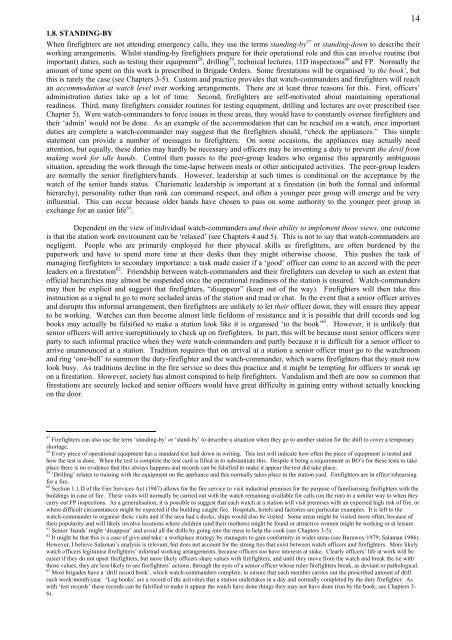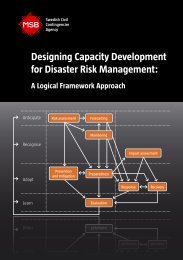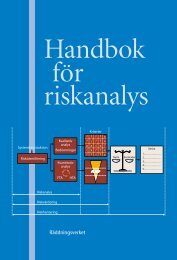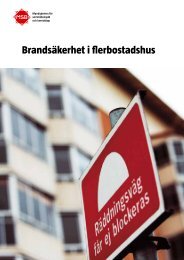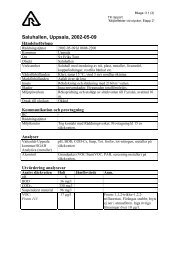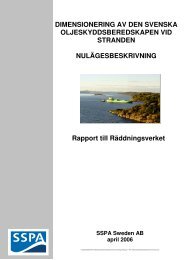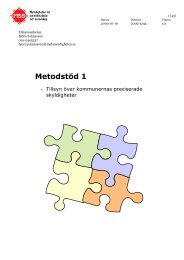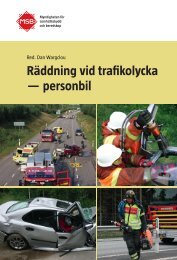One more last working class hero
One more last working class hero
One more last working class hero
Create successful ePaper yourself
Turn your PDF publications into a flip-book with our unique Google optimized e-Paper software.
1.8. STANDING-BY<br />
When firefighters are not attending emergency calls, they use the terms standing-by 57 or standing-down to describe their<br />
<strong>working</strong> arrangements. Whilst standing-by firefighters prepare for their operational role and this can involve routine (but<br />
important) duties, such as testing their equipment 58 , drilling 59 , technical lectures, 11D inspections 60 and FP. Normally the<br />
amount of time spent on this work is prescribed in Brigade Orders. Some firestations will be organised ‘to the book’, but<br />
this is rarely the case (see Chapters 3-5). Custom and practice provides that watch-commanders and firefighters will reach<br />
an accommodation at watch level over <strong>working</strong> arrangements. There are at least three reasons for this. First, officers’<br />
administration duties take up a lot of time. Second, firefighters are self-motivated about maintaining operational<br />
readiness. Third, many firefighters consider routines for testing equipment, drilling and lectures are over prescribed (see<br />
Chapter 5). Were watch-commanders to force issues in these areas, they would have to constantly oversee firefighters and<br />
their ‘admin’ would not be done. As an example of the accommodation that can be reached on a watch, once important<br />
duties are complete a watch-commander may suggest that the firefighters should, “check the appliances.” This simple<br />
statement can provide a number of messages to firefighters. On some occasions, the appliances may actually need<br />
attention, but equally, these duties may hardly be necessary and officers may be inventing a duty to prevent the devil from<br />
making work for idle hands. Control then passes to the peer-group leaders who organise this apparently ambiguous<br />
situation, spreading the work through the time-lapse between meals or other anticipated activities. The peer-group leaders<br />
are normally the senior firefighters/hands. However, leadership at such times is conditional on the acceptance by the<br />
watch of the senior hands status. Charismatic leadership is important at a firestation (in both the formal and informal<br />
hierarchy), personality rather than rank can command respect, and often a younger peer group will emerge and be very<br />
influential. This can occur because older hands have chosen to pass on some authority to the younger peer group in<br />
exchange for an easier life 61 .<br />
Dependent on the view of individual watch-commanders and their ability to implement those views, one outcome<br />
is that the station work environment can be ‘relaxed’ (see Chapters 4 and 5). This is not to say that watch-commanders are<br />
negligent. People who are primarily employed for their physical skills as firefighters, are often burdened by the<br />
paperwork and have to spend <strong>more</strong> time at their desks than they might otherwise choose. This pushes the task of<br />
managing firefighters to secondary importance: a task made easier if a ‘good’ officer can come to an accord with the peer<br />
leaders on a firestation 62 . Friendship between watch-commanders and their firefighters can develop to such an extent that<br />
official hierarchies may almost be suspended once the operational readiness of the station is ensured. Watch-commanders<br />
may then be explicit and suggest that firefighters, “disappear” (keep out of the way). Firefighters will then take this<br />
instruction as a signal to go to <strong>more</strong> secluded areas of the station and read or chat. In the event that a senior officer arrives<br />
and disrupts this informal arrangement, then firefighters are unlikely to let their officer down; they will ensure they appear<br />
to be <strong>working</strong>. Watches can then become almost little fiefdoms of resistance and it is possible that drill records and log<br />
books may actually be falsified to make a station look like it is organised ‘to the book’ 63 . However, it is unlikely that<br />
senior officers will arrive surreptitiously to check up on firefighters. In part, this will be because most senior officers were<br />
party to such informal practice when they were watch-commanders and partly because it is difficult for a senior officer to<br />
arrive unannounced at a station. Tradition requires that on arrival at a station a senior officer must go to the watchroom<br />
and ring ‘one-bell’ to summon the duty-firefighter and the watch-commander, which warns firefighters that they must now<br />
look busy. As traditions decline in the fire service so does this practice and it might be tempting for officers to sneak up<br />
on a firestation. However, society has almost conspired to help firefighters. Vandalism and theft are now so common that<br />
firestations are securely locked and senior officers would have great difficulty in gaining entry without actually knocking<br />
on the door.<br />
14<br />
57 Firefighters can also use the term ‘standing-by’ or ‘stand-by’ to describe a situation when they go to another station for the shift to cover a temporary<br />
shortage.<br />
58 Every piece of operational equipment has a standard test laid down in writing. This test will indicate how often the piece of equipment is tested and<br />
how the test is done. When the test is complete the test card is filled in to substantiate this. Despite it being a requirement in BO’s for these tests to take<br />
place there is no evidence that this always happens and records can be falsified to make it appear the test did take place.<br />
59 ‘Drilling’ relates to training with the equipment on the appliance and this normally takes place in the station yard. Firefighters are in effect rehearsing<br />
for a fire.<br />
60 Section 1.1.D of the Fire Services Act (1947) allows for the fire service to visit industrial premises for the purpose of familiarising firefighters with the<br />
buildings in case of fire. These visits will normally be carried out with the watch remaining available for calls (on the run) in a similar way to when they<br />
carry out FP inspections. As a generalisation, it is possible to suggest that each watch at a station will visit premises with an expected high risk of fire, or<br />
where difficult circumstances might be expected if the building caught fire. Hospitals, hotels and factories are particular examples. It is left to the<br />
watch-commander to organise these visits and if the area had a docks, ships would also be visited. Some areas might be visited <strong>more</strong> often, because of<br />
their popularity and will likely involve locations where children (and their mothers) might be found or attractive women might be <strong>working</strong> or at leisure.<br />
61 Senior ‘hands’ might ‘disappear’ and avoid all the drills by going into the mess to help the cook (see Chapters 3-5).<br />
62 It might be that this is a case of give and take: a workplace strategy by managers to gain conformity in wider areas (see Burawoy 1979; Salaman 1986).<br />
However, I believe Salaman’s analysis is relevant, but does not account for the strong ties that exist between watch officers and firefighters. More likely<br />
watch officers legitimise firefighters’ informal <strong>working</strong> arrangements, because officers too have interests at stake. Clearly officers’ life at work will be<br />
easier if they do not upset firefighters, but <strong>more</strong> likely officers share values with firefighters, and until they move from the watch and break the tie with<br />
those values, they are less likely to see firefighters’ actions, through the eyes of a senior officer whose rules firefighters break, as deviant or pathological.<br />
63 Most brigades have a ‘drill record book’, which watch-commanders complete, to ensure that each member carries out the prescribed amount of drill<br />
each week/month/year. ‘Log books’ are a record of the activities that a station undertakes in a day and normally completed by the duty firefighter. As<br />
with ‘test records’ these records can be falsified to make it appear the watch have done things they may not have done (run by the book; see Chapters 3-<br />
6).


